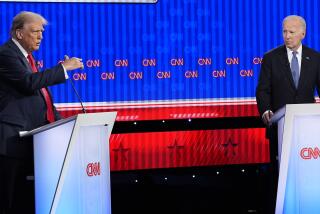In Afghanistan, Low-Key Debate Precedes High-Profile Election
- Share via
KABUL, Afghanistan — It was not exactly riveting: Three candidates and the representatives of 12 others sat at a horseshoe-shaped table Monday droning out nearly identical speeches outlining plans to fight corruption, exploit the nation’s untapped copper and gold resources and improve pay for civil servants.
At Afghanistan’s only presidential debate, interim President Hamid Karzai, the front-runner, did not even appear. His chief rival, former Education Minister Younis Qanooni, opted to campaign elsewhere -- while working behind the scenes to get the other candidates to unite behind him before Saturday’s vote.
Wonkish, earnest and formal, the debate -- which was to be broadcast later on state television and radio -- felt somehow appropriate to a country that is new to the concept and trappings of electoral politicking but is trying to adapt.
One or two sparks did fly. Wakil Mangul said that if elected he would demand to know from Karzai how $4.8 billion in aid had been spent in the last two years, adding that he could not see any results. Most of it must have gone to the pockets of warlords now living in palatial houses and driving fancy cars, he said.
Absul Sattar Sirat said he and the other 16 candidates running against Karzai were still discussing among themselves whether most would drop out of the race and back one challenger, presumably Qanooni.
Sirat, a white-bearded former justice minister and a scholar of Islamic literature, complained that the incumbent had had all the benefits of the state media, government transport for international and domestic trips and the backing of foreign groups.
“Most candidates have had only one month to campaign, whereas there are 30 provinces. It is not enough,” Sirat said. “Mr. Karzai has been campaigning for the last three years, and he has all the government resources at his disposal.”
“The main thing is that we should develop the economy of the country,” said vice presidential candidate Nelab Mobarez, the running mate of Homayoon Shah Asifi. “We have to start with the fundamentals -- otherwise we cannot achieve anything.”
What did shine through was a sense of anticipation among Afghans about what is about to occur -- the next step toward what many hope will be the emergence of a stable country instead of a wild land sapped by more than two decades of invasion, civil war and political violence.
Saturday’s election will be -- depending on the observer’s perspective -- either a historic turn toward democracy or a contrived show ripe for terrorist violence, widespread intimidation and voting fraud, with the cards stacked in favor of Karzai.
The 46-year-old incumbent, an Indian-educated ethnic Pushtun, has become the darling of the Bush administration and the international community, even though his power has been limited to the area around Kabul, the capital, because of warlords’ continued grip on the hinterlands.
He has always been seen as the favorite based on his record as acting and interim president since December 2001, a period in which most of the country has been at relative peace and the first steps toward redevelopment and reconstruction have begun.
Qanooni, his main challenger, is a 47-year-old Tajik from the north who has sought to assume the mantle of slain resistance hero Ahmed Shah Masoud, assassinated by Taliban agents in early September 2001. He is also supported by Defense Minister Mohammed Qassim Fahim, the powerful warlord who succeeded Masoud as the head of the Northern Alliance and helped lead the campaign that drove the Taliban out of Kabul in 2001.
Defying threats from Taliban fighters and other anti-American extremists, more than 10.6 million voters have registered since July, and 120,000 people have stepped forward to work at the 4,807 polling stations and counting houses that are being set up in every part of the rugged, Texas-size country. Some ballots will have to be carried on the backs of donkeys and camels across deserts and mountains to remote villages.
Hundreds of thousands of Afghan refugees will be able to vote in Pakistan and Iran.
In southern and eastern Afghanistan, remnants of the Taliban and Al Qaeda have regrouped to fight U.S. forces and the Karzai government.
Although violent attempts to disrupt the election are expected, the desire of most Afghans to vote will not be deterred, U.S. Ambassador Zalmay Khalilzad predicted at an upbeat news conference Monday.
“The efforts to thwart the election have already failed,” said the Afghan-born envoy. Shifting between English and Dari, he spoke in a makeshift embassy cafe across the street from where a new U.S. Embassy complex is rising behind a high fortress of concertina wire and truck-bomb barriers.
“The Afghan people clearly believe in these elections,” he said. “They know what they are doing. For the first time in their history, men and women, in secret ballots, will choose their leader.”
Khalilzad denied accusations that the U.S. government was favoring the incumbent and that he personally had urged one Karzai rival to drop out in order to aid the incumbent.
More to Read
Sign up for Essential California
The most important California stories and recommendations in your inbox every morning.
You may occasionally receive promotional content from the Los Angeles Times.













